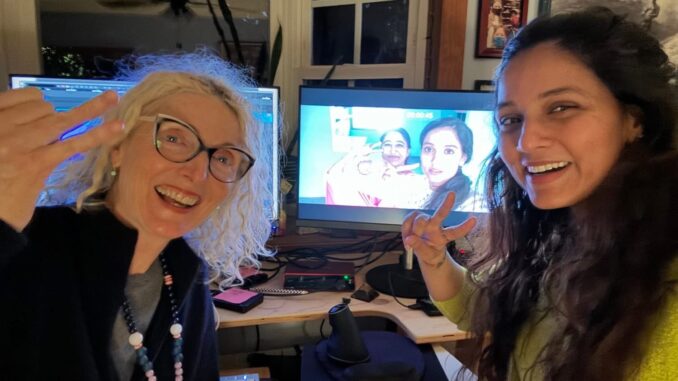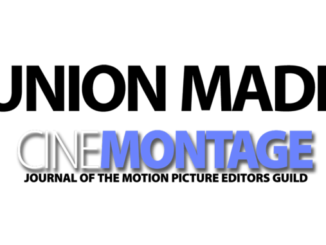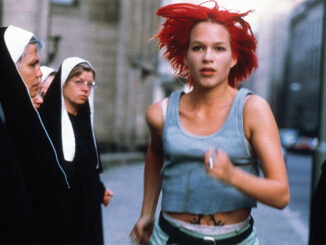
Where are you currently employed?
I’m currently unemployed.
Describe your job.
As a film editor, I see myself as a storyteller. Editing is the final “rewrite,” where many factors are pliable and myriad choices are possible. Performance choices are what most people would think of as the main focus in an editing room, but shot sequencing, rhythm, and length are all major factors. Further, the sequence of words and the scene order can reshape a project to a whole other level. I would also say that being a film editor is like being a conductor: considerable nuance comes into play for the final product to land as it does. The emotional throughline is always my main focus.
How did you first become interested in this line of work?
After high school, I received a Bachelor of Arts in Communications at what was then called the Institute of Technology in Sydney, Australia. I studied the arts, literature, writing, and film study. We also made small films, working on each other’s projects in different capacities.
Who gave you your first break?
Honestly, I had no idea how to get a job or what it would look like. I wrote to many different film companies, hoping to get work in any starter position. Then a friend working at a studio where they mixed the sound for films told me of a sound editor looking for a second assistant. I remember being so excited during the interview because the sound team was in the studio doing Foley work. I got the job. My first credit was as second assistant sound editor on Peter Weir’s “The Year of Living Dangerously.”
My editorial “upbringing” was in Australia. I was fortunate to land with many great people who became my mentors. I moved from being an assistant sound editor to assistant picture editor. Often, I was also the music editor or the liaison with the composer, a position that didn’t exist in Australia at the time.
I worked on several Peter Weir projects and also at Kennedy Miller Productions. My break into picture editing was a screen credit as associate editor on another Peter Weir film, “Dead Poets Society,” for which I edited several scenes. Prior to that, I had worked many times for Kennedy Miller as an assistant editor, the biggest credit being “Mad Max Beyond Thunderdome.”
When they were making a film called “Dead Calm,” the editor was not available to start the project, so they asked me to step in for the first six weeks. That was particularly exciting as I spent three months on a tropical island in the Great Barrier Reef! The editing room was the staff canteen room that offered a scenic view from the top of the island. It was also where we screened dailies each night, so I learned to run the projector!
Kennedy Miller were very prolific and made several mini-series. One of them, “Bangkok Hilton” starring Nicole Kidman, was my first credit as film editor. I was brought to America by one of my mentors to work at the Saul Zaentz Company on a big feature, “At Play in the Fields of the Lord.” It was shot in the Amazon jungle for seven months — but no editing had taken place! There were boxes and boxes of film to get through. I worked there for a year. That was so exciting for my first job in America.
What was your first union job?
After I made my way to Los Angeles and did several television movies, my first feature film, “Foxfire,” went union, so I became a union member. My first TV series was “The X-Files.”
What credits or projects are you proudest of, and why?
There have been so many highlights. I love working with producers who see me as a collaborator rather than just a worker. I love the freedom to experiment and shape the storytelling. I love working with people who trust me fully.
On “True Blood,” working with Alan Ball was certainly a highlight. Freedom and fun!
Also, a series called “Chance.” During Season 2, the editorial was fascinating. Jonas Pate, the directing producer, wanted to create a certain internal POV, mood, and feel. I can easily say no other project I’ve worked on has relied as much on editing to create that. Editorial was given total freedom — it’s difficult to describe — but it worked! Alexandra Cunningham, the executive producer, totally trusted us. I truly felt like the conductor on that project.
I worked on the television series “Snowfall” for FX for six years. They promoted diversity and advancing new talent, especially directors, so the highly experienced editorial department offered stability. I mentored many new directors and again had a massive amount of freedom and trust from the producers. Out of my 18 episodes, 12 were from directors making their debut.
My most recent project, “Pinch,” an independent movie I helped reshape, has so much heart. I love this film! It’s a darkly comic exploration of guilt, trauma, and the strength it takes to stand up to power. Uttera Singh — the writer, director, producer, and star — totally trusted me. I took a leap during the writers strike to help, and now the reward: it’s nominated in this year’s Tribeca Festival. Out of 13,541 submissions, it’s one of only 118 films accepted! Definitely a highlight.
What was your biggest challenge in your job (or on a particular project) and how did you overcome/solve it?
Hmmm… Editorial challenges come up daily. There is no right or wrong or perfection. Even with a highly experienced director, there’s likely to be some issues to solve. On one project, the director didn’t create any transition for the “leap in time” in a courtroom scene. They shot it as continuous, and as such, the dialogue made no sense when one scene ended and another began without any demarcation. The producer asked me to create a transition. I made camera moves, changed shot sizes, used sound distractions, and created a transition style out of not much at all.
“Friday Night Lights” was a constant challenge as every scene had three cameras, and the football games had seven. Crew members were quite often in the shot, and the actors were constantly ad libbing. Working around all that was frustrating, yet also highly rewarding. I always say that after that show, nothing could be as difficult.
What was the most fun you’ve had at work?
Definitely on “Pinch,” the independent movie. As I said, this movie has so much heart and humor. We were making our own schedule and focusing on getting it right without an overseeing producer forcing our hand. The editorial team had a massive amount of fun. I always have a mini trampoline in my editing room. I think it’s important to counteract all the sitting. We edited “Pinch” in a house with a huge trampoline in the backyard. That was our fun healthy break, and resting in restorative yoga poses replenished our energy.
Jobwise, what do you hope to be doing five years from now?
I would love to be working on a heartfelt movie. I do love mentoring, so maybe some teaching, also.
What are your outside activities, hobbies, passions?
Yoga, hiking, biking, travel. I’ve practiced meditation for 30 years, so that’s very important to me.
Favorite movie(s)? Why?
Even though it’s a bit dated, I still love “Unforgiven.” Also, anything by Hitchcock. Films directed by Eastwood and Hitchcock have been major influences on me, editorially — the storytelling that’s there in the silence. I like that.
Favorite TV program(s)? Why?
That is ever-changing. I don’t think I can pinpoint any. Great writing is what I respond to.
Do you have an industry mentor?
In many ways, I would consider a mentor as anyone I’ve engaged with creatively in the editing room. There is always so much to learn. I’m very curious and open. And I think we all learn from each other, no matter how much experience is in the room. Among the early mentors to whom I am most grateful is Richard Francis-Bruce. As his assistant, I would sit next to him and pass him the film; he actively told me what he was doing and why. William Anderson was very open to teaching also. He brought me to America. Also, being in the room with a master filmmaker like George Miller was extraordinary. George is a director who completely understands and respects the power of editing.
What advice would you offer to someone interested in pursuing your line of work?
Finding an editor who wants to mentor you is important. Be curious and ask questions. Make yourself useful and reliable. Listen to others, even if you think they’re wrong; just listen. Make sure you look after your physical health and balance your lifestyle. DO NOT EAT AT YOUR MACHINE! Take breaks. Be a team player.
Was there ever a circumstance when you had to rely on the Guild for help or assistance?
Just recently, the Guild was amazingly helpful. I’m displaced due to the LA fires, and the Guild assisted me with certain paperwork and resources. It made me realize even more the importance of community and being in a union.
Is there anything you’d like to say to your fellow Guild members, some words of encouragement?
I wish everyone some peace in this crazy time we’re all in with our industry. I don’t believe technological advancements can replace storytelling; I prefer to see AI as a resource. And I long for the time when editorial becomes even more appreciated for its part in this industry. I also long for a more equal distribution of wealth. It takes a village.
Compiled by David Bruskin.





Be the first to comment